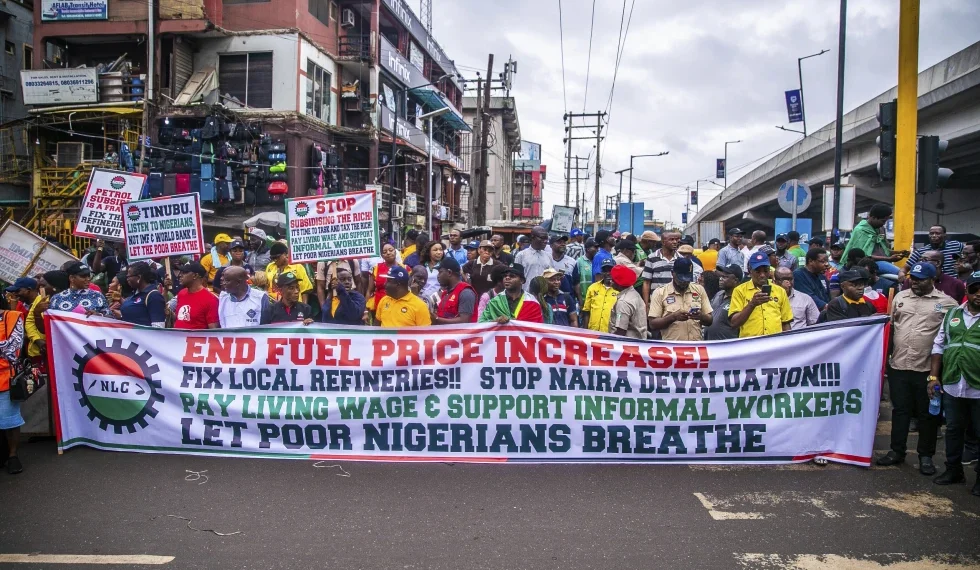In response to widespread demonstrations over the escalating cost of living, security forces in Nigeria have ramped up their presence in Lagos and Abuja, bracing for a series of nationwide protests anticipated to last for ten days.
The unrest, triggered by severe economic strains, has seen clashes between protesters and authorities, with police using tear gas to disperse crowds in key locations.
On the first day of the protests, police in Abuja fired tear gas to break up a gathering near the Presidential Villa.
The unrest has not been confined to the capital; in Bauchi and Borno states in the northeast, security forces also used tear gas on demonstrators.
The exact number of arrests made during these confrontations remains unclear.
Nigeria, Africa’s most populous country, is grappling with soaring inflation and a significant devaluation of its currency, the naira.
These economic challenges followed President Bola Ahmed Tinubu’s sweeping reforms aimed at revitalizing the nation’s economy.
Introduced about a year ago, these reforms included the removal of subsidies on fuel and other essential goods, which has exacerbated the cost of living for many Nigerians.
Under the banner of #EndbadGovernanceinNigeria, the current wave of protests has garnered significant online support.
The movement reflects widespread frustration with food inflation rates nearing 40 percent and a tripling of fuel prices since the introduction of Tinubu’s economic reforms.
To contain the protests, security forces have blocked access to key sites, such as Abuja’s Eagle Square, a planned location for demonstrations.
Authorities Intensify Security as Economic Protests Persist
In Lagos, police and soldiers have been strategically stationed at crucial points, including the Lekki toll gate, a site of violence during the 2020 anti-police brutality protests.

Adegoke Fayoade, Lagos’s police commissioner, emphasized the importance of maintaining peace during the current protests.
“Duty is very clear: to ensure that the protest is peaceful, devoid of violence, devoid of the horrific things that happened during the rising in 2020,” Fayoade stated.
In response to the economic hardships, the Nigerian government announced measures on Wednesday, including distributing grain and providing aid to the most vulnerable citizens.
Despite these efforts, many Nigerians are stocking up on essentials, fearing the potential for escalating violence.
Activist Ismail Olushola Oladare, who was also involved in the 2020 protests, voiced the discontent of many Nigerians.
“The police are brutalizing the Nigerian people and people want that to stop,” Oladare said. “Today, this particular protest and bad governance protest is about the standard of living of people.”
Organizers of the protests, a coalition of civil society groups, are determined to continue their rallies despite facing legal restrictions limiting them to public parks rather than allowing marches.
Omolola Pedro, one of the protest leaders, explained that the goal is to signal to the government that Nigerians are fed up with what they see as human rights abuses and the unstable economic situation stemming from recent policies.
The protest organizers have outlined 19 demands, with the removal of the state subsidy on petroleum products being a central issue.
This demand reflects a broader dissatisfaction with the economic policies that have contributed to the current crisis.
The demonstrations in Nigeria come on the heels of similar unrest in Kenya, where President William Ruto faced backlash and was forced to abandon planned tax increases.
In Uganda, police have detained numerous individuals involved in banned anticorruption protests, which were inspired by the unrest in Kenya.
Nigeria’s Inspector General of Police, Kayode Egbetokun, has expressed concern over the potential for violence.
“Some groups of people, self-appointed crusaders and influencers, have been strategizing and mobilizing potential protesters to unleash terror in the land under the guise of replicating the recent Kenya protests.”
Kayode Egbetokun
He assured that security forces will not tolerate any attempts to disrupt peace or damage critical infrastructure.
READ ALSO: Minister of Lands and Natural Resources Addresses Parliament’s Assurance Committee




















